| Listing 1 - 10 of 46 | << page >> |
Sort by
|
Book
ISBN: 153610681X 9781536106817 9781536106671 Year: 2017 Publisher: New York
Abstract | Keywords | Export | Availability | Bookmark
 Loading...
Loading...Choose an application
- Reference Manager
- EndNote
- RefWorks (Direct export to RefWorks)
Ecology --- Ecological research --- Research.
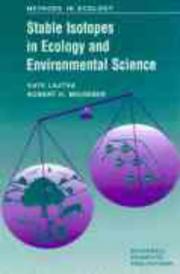
ISBN: 0632031549 Year: 1994 Publisher: Oxford : Blackwell,
Abstract | Keywords | Export | Availability | Bookmark
 Loading...
Loading...Choose an application
- Reference Manager
- EndNote
- RefWorks (Direct export to RefWorks)
Book
ISBN: 0387967125 Year: 1988 Publisher: New York (N.Y.) : Springer,
Abstract | Keywords | Export | Availability | Bookmark
 Loading...
Loading...Choose an application
- Reference Manager
- EndNote
- RefWorks (Direct export to RefWorks)
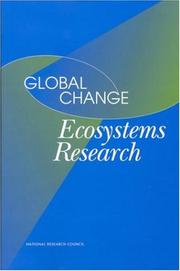
ISBN: 0309071488 9786610185320 1280185325 0309564794 9780309564793 9780309071482 0309083605 9780309083607 0309183901 Year: 2000 Publisher: Washington, D.C. National Academy Press
Abstract | Keywords | Export | Availability | Bookmark
 Loading...
Loading...Choose an application
- Reference Manager
- EndNote
- RefWorks (Direct export to RefWorks)
Ecology -- Research. --- Ecology --- Research. --- Ecological research
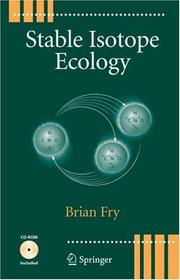
ISBN: 9780387305134 9780387337456 0387305130 0387337458 Year: 2006 Publisher: New York : Springer,
Abstract | Keywords | Export | Availability | Bookmark
 Loading...
Loading...Choose an application
- Reference Manager
- EndNote
- RefWorks (Direct export to RefWorks)
Stable isotopes are frequently used as tracers in biological systems, and their ability to track changes and processes over time has made them increasingly important to ecological research. For ecologists, stable isotopes provide a natural way to directly trace details of element cycling in the environment. Stable Isotope Ecology provides a solid introduction to this advanced subject, and can also be used as an instructive review for more experienced researchers and professionals. The book approaches the use of isotopes from the perspective of ecological and biological research, but its concepts can be applied within other disciplines as well. In order to enable scientists to establish source-sink connections in ecological settings, Stable Isotope Ecology begins by reviewing fundamental topics of tracer fractionation and mixing. Several mini-reviews profile problems and successes encountered with isotope tracing in particular focus areas, while emphasizing the role that humans increasingly play in changing our planetary ecosphere. A novel, step-by-step spreadsheet modeling approach is also presented for circulating tracers in any ecological system, including any favorite system an ecologist might dream up while sitting at a computer. Just type in values and watch the isotope action unfold in the dynamic models. Fry's humorous and lighthearted style painlessly imparts the principles of isotope ecology, using a unique, hands-on approach to engage students. The mechanics of fractionation and mixing are laid out in simple steps, with numerous examples and accessible mathematics (algebra only). The book encourages students to begin their own pilot project with stable isotopes. About the Author: Dr. Brian Fry is a Professor in the Coastal Ecology Institute and the Department of Oceanography and Coastal Studies at Louisiana State University in Baton Rouge, Louisiana. His mother and father both used isotopes in their research careers, so he is a second generation isotope scientist.
Stable isotopes in ecological research. --- Stable isotopes in ecological research --- GG Geochemistry --- Ecology --- Geochemie --- Research
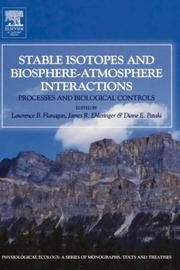
ISBN: 9780080525280 0080525288 9780120884476 012088447X 1281023981 9786611023980 Year: 2005 Publisher: San Diego Oxford Elsevier Academic
Abstract | Keywords | Export | Availability | Bookmark
 Loading...
Loading...Choose an application
- Reference Manager
- EndNote
- RefWorks (Direct export to RefWorks)
The emerging multidisciplinary field of earth system science sets out to improve our understanding functioning ecosystems, at a global level across the entire planet. Stable Isotopes and Biosphere - Atmosphere Interactions looks to one of its most powerful tools - the application of stable isotope analyses - to understanding biosphere-atmosphere exchange of the greenhouse gases, and synthesizes much of the recent progress in this work. Stable Isotopes and Biosphere - Atmosphere Interactions describes recent progress in understanding the mechanisms, processes and applicati
Book
Year: 1985 Publisher: Havana, Ill River Research Laboratory, Illinois Natural History Survey
Abstract | Keywords | Export | Availability | Bookmark
 Loading...
Loading...Choose an application
- Reference Manager
- EndNote
- RefWorks (Direct export to RefWorks)
Ecology --- Long term ecological research --- Illinois River --- Mississippi river
Book
ISBN: 9781631170928 1631170929 Year: 2014 Publisher: New York
Abstract | Keywords | Export | Availability | Bookmark
 Loading...
Loading...Choose an application
- Reference Manager
- EndNote
- RefWorks (Direct export to RefWorks)
Environmental sciences --- Ecology --- Agriculture --- Agricultural research --- Ecological research --- Environmental science --- Science --- Research.
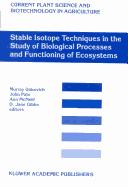
ISBN: 0792370783 Year: 2001 Publisher: Dordrecht ; Boston : Kluwer Academic Publishers,
Abstract | Keywords | Export | Availability | Bookmark
 Loading...
Loading...Choose an application
- Reference Manager
- EndNote
- RefWorks (Direct export to RefWorks)
Crops --- Stable isotopes in ecological research --- Stable isotopes in plant physiology research --- Ecophysiology --- Congresses.
Book
ISBN: 9781405126809 Year: 2007 Publisher: Malden (Mass.) : Blackwell Pub.,
Abstract | Keywords | Export | Availability | Bookmark
 Loading...
Loading...Choose an application
- Reference Manager
- EndNote
- RefWorks (Direct export to RefWorks)
| Listing 1 - 10 of 46 | << page >> |
Sort by
|

 Search
Search Feedback
Feedback About UniCat
About UniCat  Help
Help News
News